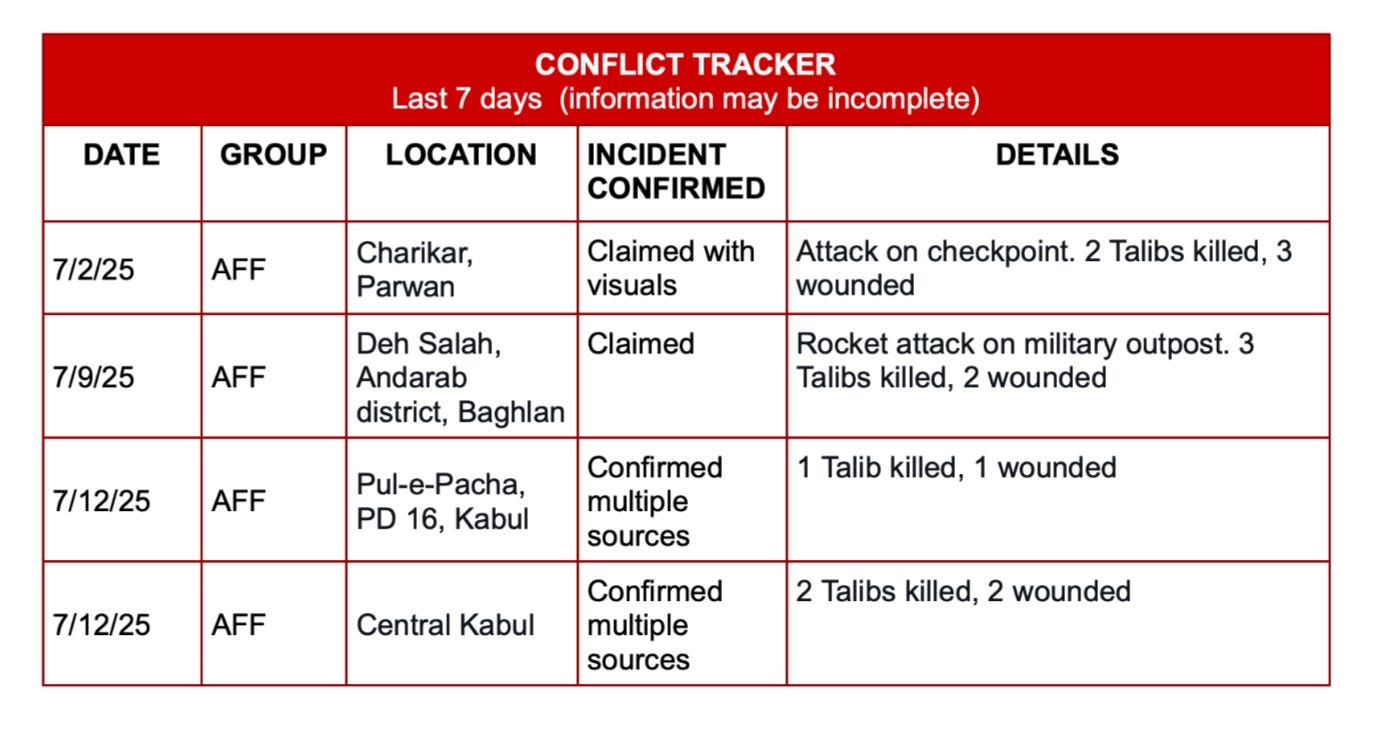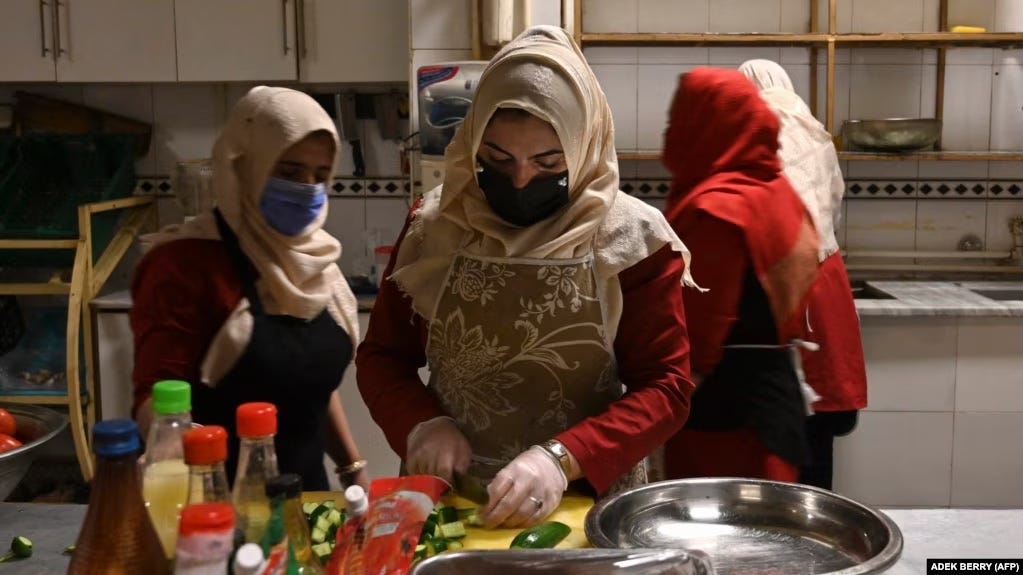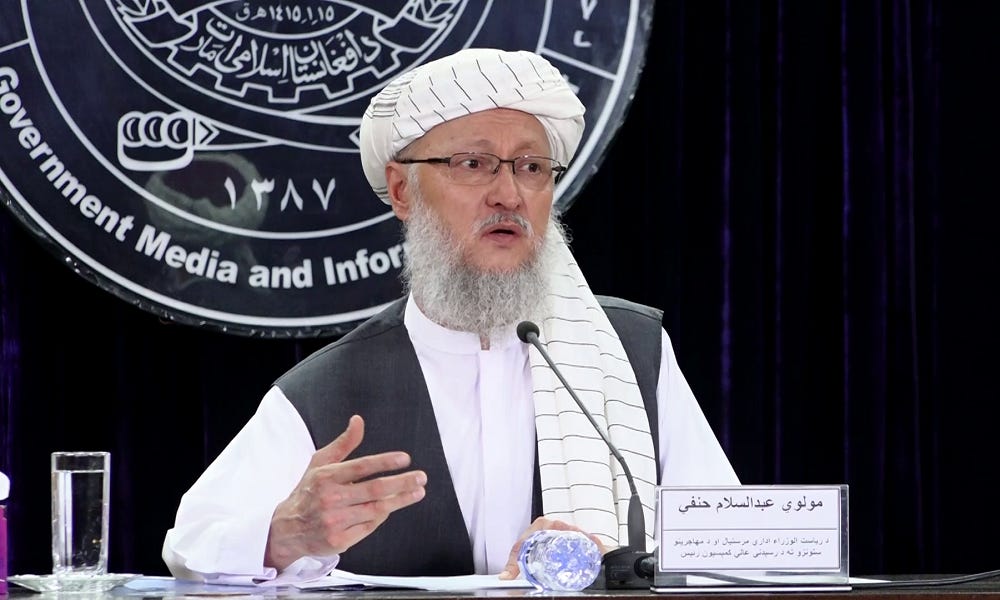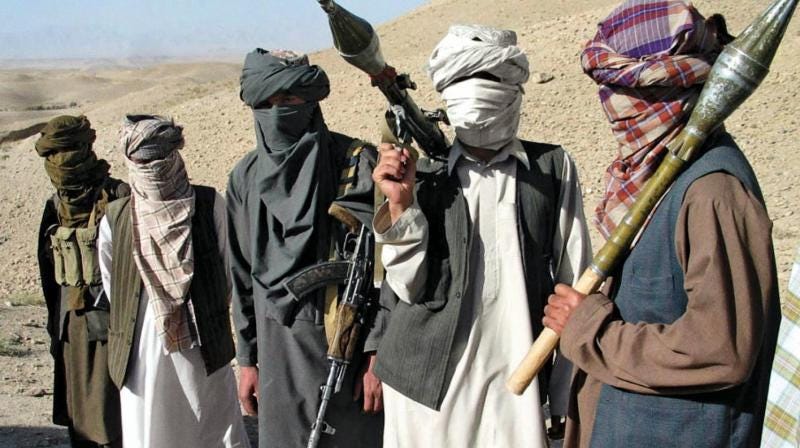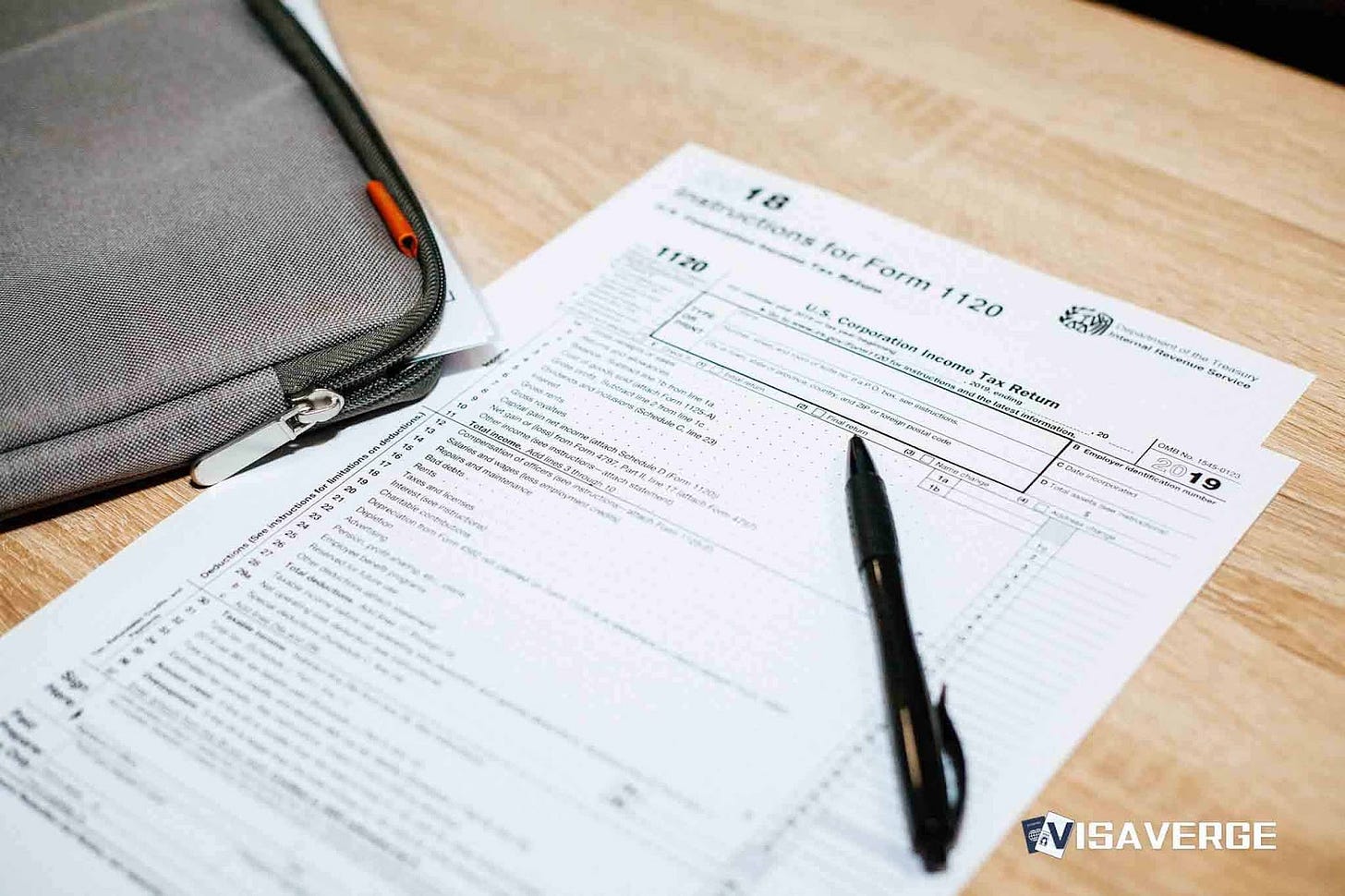Security and Conflict
UNAMA Report on Security Incidents – A new report by UNAMA states that between February 1 and April 30, 2025, anti-Taliban armed groups carried out 72 attacks. The NRF claimed 56, the AFF 16, and the Afghanistan Liberation Movement three—all in April. Eleven attacks remain unclaimed. UNAMA confirmed three major incidents targeting the Interior Ministry in Kabul, Nijrab district in Kapisa, and Bagram Airport. Among these groups, only the AFF declared a ceasefire during Ramadan.
Two NRF Commanders Executed – On July 5, the Taliban executed two NRF commanders, Hakimullah Khan and Ahmad Ali, in the remote Malam-Khak mountains of Panjshir, the NRF confirmed. The men had reportedly been arrested a week earlier in Abdullah Khel district and tortured before being killed by firing squad.
Taliban Clash with ISKP – On Tuesday, a Taliban fighter was killed and another injured during clashes with ISIS militants in the Nurlam Saib Dara area of Alingar district, Laghman province. Local sources reported the confrontation is ongoing, with ISIS members surrounded in a residence. The Taliban have not issued an official statement, but ISKP has confirmed the incident. Days earlier, similar fighting in Kunar province left a senior ISIS commander and two others dead, amid continued Taliban operations against ISIS across several provinces.
Human Rights and Civil Liberties
Muharram Restriction – During this year’s Muharram observances, the Taliban imposed unprecedented restrictions on Shiite mourning rituals across multiple provinces, including Kabul, Herat, Balkh, Bamiyan, and Ghazni. Residents reported bans on photography, disrupted ceremonies, and limits on public flag displays. In Herat’s Shiite-majority areas, Taliban forces dismantled mourning tents, tore down banners, and allegedly fired on mourners, injuring two. Several individuals were also detained. Though these mourning setups had prior approval, Taliban authorities reversed agreements and enforced strict limitations, such as allowing only two flags per mosque. Residents voiced frustration, calling for freedom to practice their faith. Human rights advocates condemned the actions as violations of religious freedom and warned of rising sectarian tensions.
Former ANP Killed – On Wednesday, Obaidullah Panjshiri, a former senior police officer from Panjshir, was shot dead in Kabul’s Karte Naw area by unidentified gunmen. A former colonel under the previous government, he had been unemployed and living a civilian life since the regime's collapse. The motive remains unknown, and his family stated he had no known enemies. His killing adds to a string of mysterious deaths among ex-security personnel, often suspected to involve Taliban reprisals, though the group denies involvement.
Former Special Forces Officer Killed – On Friday night around 2 a.m., a former special forces officer of the previous Afghan government, named Nusrat, was killed in Kunar’s Noor Gul district when unidentified attackers threw a grenade at him near the local market. He had been working at a fuel station after the regime change and reportedly had no personal disputes. Taliban authorities have not commented.
MoPVPV Kills Civilian in Kandahar – On Saturday, a clash in Kandahar city between the Taliban’s morality police and civilians over beard shaving reportedly led to one civilian's death and another being injured
Ulema Council Member Arrested – On Thursday, the Taliban arrested Mawlawi Abdulmalik, a former deputy of Panjshir’s Ulema Council, at a mosque in Kabul. He was previously detained in 2022 over alleged ties to the National Resistance Front and released after two years due to lack of evidence. His re-arrest underscores ongoing Taliban crackdowns on Panjshir residents and former officials, many of whom face arbitrary detention, torture, or execution.
Floggings – This week a total of sixteen people, including one woman were flogged in Kaipisa, Kabul, Faryab and Ghazni.
Internal Politics
MoPVPV Clarifies Role in Civilian Complaints – On Friday, the Ministry for the Propagation of Virtue and Prevention of Vice clarified its limited role in addressing civilian complaints. In a public statement, the ministry outlined three categories of grievances: citizen vs. citizen (handled by civil courts), military vs. military/state (handled by military courts), and civilian vs. state. Only the third—complaints by civilians against Taliban officials or agencies—falls under the ministry's jurisdiction. The aim is to streamline complaint handling within the Taliban system.
Taliban Police Required to Wear Uniforms – On July 6, Sirajuddin Haqqani ordered all Taliban police officers to wear official uniforms while on duty, banning plainclothes patrols. Despite previous directives, many officers continued to wear traditional dress, causing public confusion and raising security concerns. Interior Ministry spokesman Abdul Mateen Qani said the measure aims to help civilians more easily identify law enforcement personnel. The change follows reports of thefts and fatal shootings involving Taliban members in local attire.
Haqqani Travels to Ghazni – On Friday, Interior Minister Sirajuddin Haqqani visited Ghazni, meeting senior officials and pledging to address local issues with relevant ministries. He emphasized the importance of fulfilling governmental responsibilities and upholding the “rights of the Islamic system.”
International Developments
UN General Assembly Adopts Resolution on Afghanistan – On Monday, during the 83rd session of the UN General Assembly, member states adopted a resolution—116 in favor, two against (U.S. and Israel), and 12 abstentions—calling on Afghanistan to uphold human rights, form an inclusive government, and combat terrorism. The resolution condemned the Taliban’s systemic oppression of women and girls and urged a reversal of discriminatory policies. While Germany and the EU emphasized engagement without legitimizing repression, countries like Uzbekistan and Turkey focused on education and regional security. Several states, including Russia, Iran, and China, criticized the resolution as unbalanced or politicized. The UN and member states warned that Afghanistan faces a dire humanitarian crisis requiring urgent, collective international action.
ICC Issues Arrest Warrant For Taliban Leaders – On Tuesday, the International Criminal Court issued arrest warrants for Taliban Supreme Leader Haibatullah Akhundzada and Chief Justice Abdul Hakim Haqqani, citing crimes against humanity, specifically gender and political persecution since August 2021. The ICC found that both leaders ordered and institutionalized oppressive policies targeting women, girls, LGBTQ+ individuals, and perceived allies—depriving them of education, freedom, and basic rights. The court cited systemic abuses including bans, torture, and enforced disappearances. The Taliban rejected the warrants, calling the ICC illegitimate and its actions anti-Islamic. Rights groups, however, hailed the move as a historic step toward accountability. The warrants remain sealed to protect witnesses, though were publicized to deter further abuses. The ICC full statement can be accessed Here
US Department of State Layoffs – On Friday, the U.S. Department of State began implementing layoffs affecting over 1,300 employees, as part of a Trump-era federal downsizing initiative. Additional layoffs are expected, amounting to approximately 15% (3,000 people total) of the department. These actions were enabled by a recent Supreme Court ruling. Among the changes is the planned closure of CARE. CARE is undergoing its second round of cutbacks, though it appears the office has not yet fully closed. The Trump administration has publicly stated that CARE will close by September 30. CARE flights were previously halted under the same administration. Despite these layoffs, SIV case processing continues.
US Statement on UN Resolution – Also on Monday, U.S. Representative Jonathan Shrier strongly opposed the UN General Assembly’s resolution on Afghanistan, calling it a reward for Taliban failure. As one of only two nations voting against the resolution, Shrier criticized continued engagement without results, particularly regarding human rights and terrorism. He also condemned Iran’s treatment of Afghan refugees and insisted the Taliban must demonstrate tangible progress. Shrier argued that unconditional support undermines accountability and reinforces the Taliban’s oppressive rule—especially against women and girls.
New OCHA Report – On Monday, OCHA released a new report warning of Afghanistan’s deepening humanitarian crisis, following a five-day visit by Tom Fletcher. He reported budget shortfalls that have forced the closure of 400 health centers and described the health system as “catastrophic,” especially for mothers and infants. Over 180,000 returnees from Pakistan face dire conditions, further exacerbated by climate change. Fletcher announced $16.6 million in emergency funding and launched a 2025 Integrated Response Plan to address both immediate aid and long-term recovery. He urged global political and financial support, stressing, “Afghanistan tops the UN’s crisis list—lives are at risk without donor backing.”The full report can be accessed Here
UN Officials Visit Herat – On Saturday, Roza Otunbayeva, UNAMA chief and UN Special Representative, visited Islam Qala border with UNHCR’s Jamal Arifat to assess Afghan returnees from Iran. In a meeting with Taliban governor Noor Ahmad Islamjar, they discussed the return process, the role of international agencies, and urgent returnee needs. The Taliban said the visit aimed to evaluate conditions and improve management. UNAMA stressed the importance of international cooperation to better support returnees through direct field assessments and coordination with involved organizations.
Freedom of the Press
New AFJC Report – A new report by the Afghanistan Journalists Center (AFJC) reveals 140 press freedom violations in the first half of 2025—a 56% increase from last year—highlighting a growing Taliban crackdown on independent media. The Ministry for the Promotion of Virtue and Prevention of Vice has enforced bans on visual content and women’s voices, leading to the suspension of 26 media outlets. At least 20 journalists have been detained, six of whom remain imprisoned. Female-led media outlets face increasing obstacles, including license restrictions. The AFJC warned of a climate of fear and self-censorship, urging Taliban compliance with media laws and calling for international pressure to safeguard press freedoms.
Journalist Detained in Nangarhar – On Thursday, Taliban intelligence forces in Nangarhar arrested former journalist Aziz Watandost and two companions in Jalalabad’s Zangui area. Watanwal, previously with Khurshid TV, was reportedly taken during a raid on his home, during which agents allegedly threatened his family at gunpoint. His relatives confirmed the arrests, but Taliban officials have yet to release any statement regarding the incident or the individuals’ whereabouts.
Regional Developments
Russia Recognizes the Taliban – Last week, Russia became the first country to officially recognize the Taliban government, raising the Taliban flag over the Afghan embassy in Moscow. The Taliban’s Foreign Ministry confirmed the move, though Russia's Foreign Ministry has yet to issue a public statement. The decision drew sharp criticism from UN envoy Richard Bennett and Afghan rights activists, who warned it legitimizes Taliban abuses.
False Reports of Tajikistan Deportations – On Friday, Tajikistan’s Asia-Plus news agency reported that claims of Afghan refugee deportations were unfounded. Citing the Afghan Embassy in Dushanbe and Mosawer Bahaduri, head of the Afghan Refugees Committee in Tajikistan, the report confirmed that no forced removals have occurred and no complaints have been filed. The embassy also denied reports of police-led deportation efforts, refuting earlier media claims of a 15-day deadline issued by Tajik authorities.
Afghanistan Increased Trade with Pakistan – In the first half of 2025, Afghanistan–Pakistan trade reached $989 million, with Afghan exports totaling $277 million and imports from Pakistan at $712 million. Key Afghan exports included coal, cotton, and raisins, while imports featured rice, sugar, and pharmaceuticals. Despite the Ghulam Khan crossing’s closure, exports improved compared to last year, now routed via Chaman, Torkham, Spin Boldak, and Dand Patan. Afghan officials stress ongoing diplomatic engagement, citing Pakistan as a crucial trade partner.
Taliban Seek to Buy Weapons from Russia – Following Russia’s recognition, the Taliban officially requested to purchase military equipment from Moscow, according to Nezavisimaya Gazeta. In a letter signed by Defense Minister Mullah Mohammad Yaqoob, the Taliban expressed interest in Russian arms, citing their quality, quantity, and the potential for mutual understanding. The request signals a new phase of cooperation and tests Russia’s willingness to engage in defense collaboration.
Deputy Minister Travels To China – On Wednesday, Taliban Deputy Minister for Railways Mohammad Ishaq Sahibzada traveled to China to attend the 12th Congress of the International Union of Railways. Around 3,000 officials, experts, and company leaders are participating in the event to discuss railway industry growth, technical innovation, and investment. Afghanistan, a UIC member since 2013, will engage in discussions on transport development and capacity-building in the global railway sector.
NEXT WEEK
In Afghanistan, Russia’s recognition of the Taliban and growing regional engagement are likely to embolden the group. Following past patterns, the Taliban are expected to intensify crackdowns—particularly for moral crimes—in response to the ICC arrest warrants. These crackdowns are likely to disproportionately affect women and minorities, especially Shia communities during Muharram. In recent weeks, significant unrest in Badakhshan over poppy eradication and ethnic tensions was met with violent force by the Taliban. This conflict may flare again in the coming week.
Afghans in Iran are advised to exercise extreme caution amid ongoing mass deportation efforts. While reports remain unclear regarding the specifics of detentions and targeted groups, all Afghans should assume they may be at risk of deportation. It is critical to carry valid documentation of legal status at all times; however, individuals may be targeted regardless of status. Movement should be minimized, large gatherings avoided, and valid identification kept readily available.
In Pakistan, deportations continue but appear to have slowed. Reports indicate a temporary pause in the deportation of PoR cardholders, though it is uncertain whether all provincial and local authorities are observing this directive. Afghans in Pakistan should continue to carry proof of legal status at all times.
In the United States, a broad travel ban affecting Afghans remains in place. Although SIV holders are currently exempt, implications for other visa categories remain unclear. For now, international travel is strongly discouraged for Afghans—including Green Card holders—as re-entry to the U.S. may become more difficult in the coming months. More information on the travel ban can be found here
In the U.S., recent layoffs at the CARE office have affected both leadership and staff, with a full closure expected by September 30. While these reductions were anticipated, the cutbacks are likely to slow case processing. SIV and immigrant visa cases continue to be processed, but must now be handled by U.S. embassies or consulates in third countries. Applicants are responsible for all related expenses, including travel, medical exams, accommodation, and onward travel to the United States. They must also maintain legal status (i.e., a valid visa) in the third country. Those considering transferring their case are strongly encouraged to research visa processing times and cost-of-living conditions in the host country beforehand.
Recently arrived SIV holders who were previously ineligible for resettlement assistance may now qualify. They are encouraged to contact their local resettlement agency for updated information and support.
Temporary Protected Status for Afghans in the U.S. is set to expire tomorrow (July 14), despite ongoing litigation. Those whose only legal status is TPS should seek legal assistance immediately. All Afghans in the U.S. are reminded to carry their Green Card or proof of legal status at all times.
REGIONAL ROUNDUP
IRAN
Deportations Increase – Following the expiration of the registration deadline on July 6, Iran is set to expel over 2 million Afghan migrants holding temporary census documents. Despite calls from a provincial official to extend the deadline, deportations have surged. Iran reports over 772,000 Afghan migrants returned by July 1, mainly via Dogharoon, Milak, and Mahiroud crossings. Estimates note up to 50,000 Afghans returned from Iran daily. While Iran claims most returns are voluntary, UN agencies assert over 70% are forced. UNHCR warns up to 3 million Afghans may return by year’s end, stressing Afghanistan’s inability to manage such volume. Over 1.6 million have already returned in six months, exceeding projections.
PAKISTAN
Pakistan Halts Deportation of Afghan PoR – Pakistan’s Ministry of States and Frontier Regions (SAFRON) has ordered all provincial and regional authorities to halt any action against Afghan refugees holding valid Proof of Registration (PoR) cards. The government is reviewing a proposal to extend their legal stay by three to six months. PoR cards, held by over 1.3 million Afghans, expired on June 30. While a formal extension awaits cabinet approval, SAFRON emphasized that no deportation or punitive actions should be taken in the interim. Last year’s extension was widely welcomed, but no official decision has been communicated yet—raising concerns amid continued uncertainty. Deportations of undocumented Afghans continue from Pakistan.
Nine Killed in Balochistan – On Friday, nine bus passengers—laborers from Punjab—were found shot dead in Balochistan after being abducted by militants, according to Pakistani officials. The BLF claimed responsibility, accusing the victims of spying for Pakistani intelligence. Authorities stated the victims were returning home, including two brothers en route to their father’s funeral. Pakistan accused India of backing Baloch separatists, who have intensified attacks amid ongoing military operations in the insurgency-hit, mineral-rich province.
SPOTLIGHT ANALYSIS
Atlantic Council
Is the tide turning for justice? On Tuesday, the International Criminal Court (ICC) in The Hague issued arrest warrants for the Taliban’s supreme leader, Hibatullah Akhundzada, and the group’s chief justice, Abdul Hakim Haqqani, for crimes against humanity of persecution against women, girls, and others. Since retaking the country in August 2021, the Taliban has imposed strict controls on women and girls through repressive decrees and brutal enforcement, with no sign of easing up. To answer our burning questions about these warrants, we turned to our experts on international law and gender apartheid.
AFGHAN NEWS
Taliban's Closure Of Women's Shelters Leaves Afghan Women Vulnerable To Abuse
Firuza Azizi
Morsal and her three underage children live in a ramshackle outbuilding in her in-laws’ house in eastern Afghanistan.
With the country’s de facto Taliban rulers cutting off almost all access to jobs for women and no welfare system in place in the country to support families in need, the 40-year-old widow and her children -- including a disabled son -- have little protection or support.
There was a time when Morsal, whose name has been changed to protect her identity, could turn to one of several women’s shelters in Afghanistan.
REGIONAL NEWS
Afghanistan’s Deputy PM Hanafi confirms ongoing talks with Iran amid refugee crisis
Ariana News
Abdul Salam Hanafi, Deputy Prime Minister for Administrative Affairs and head of the High Commission for Addressing the Problems of Returning Afghan Refugees, says over 500,000 Afghan migrants have returned from Iran in the past month alone — a mass return that has sparked urgent diplomatic engagement between Kabul and Tehran.
Speaking at a press conference in Kabul on Thursday, Hanafi acknowledged that the pace of deportations remains high, with more than 40,000 people crossing daily through the Islam Qala and Silk Bridge border crossings in western Afghanistan.
IOM: Over 264,000 Afghan Migrants Entered from Iran in Just Nine Days
Kabul Now
The International Organization for Migration (IOM) has reported that more than 264,000 undocumented Afghan migrants crossed into Afghanistan from Iran over the past nine days, as deportations from Iran escalate dramatically.
In a post on X today, the organization stated that the number of returnees from Iran has reached 546,000 since June 1 and more than one million since the beginning of the year.
Pakistan Urges Taliban to Act Against TTP Amid Rising Cross-Border Attacks
Kabul Now
Pakistan has once again called on the Taliban to take action against the Tehreek-e-Taliban Pakistan (TTP) militants operating in Afghanistan, as cross-border attacks in border areas have increased.
In a press briefing on Friday, Pakistan’s Foreign Ministry spokesperson, Shafqat Ali Khan, said that the presence of militant groups in Afghanistan poses a significant obstacle to strengthening bilateral relations and regional cooperation.
“This is a point we continue to emphasize with the Afghan side,” Khan said. “We highlight with proofs what is happening, the cost Pakistan is paying, the cost the bilateral relationship is paying, and the cost efforts to regional development and integration are paying.”
Teenage Afghan Migrant Dies Under Torture in Iranian Police Custody, Sources Say
Kabul Now
A teenage Afghan migrant has died in Iranian police custody in Tehran after being severely tortured, local sources told KabulNow.
The victim, Usmandullah Armani, was from Nangarhar province in eastern Afghanistan. He had been living and working in Iran for the past two years.
According to sources familiar with the case, Iranian police arrested Armani in Tehran about a week ago, and he died in custody after enduring severe torture.
INTERNATIONAL NEWS
Taliban denounces International Criminal Court warrant for emir, chief justice
Bill Roggio
The Taliban rejected arrest warrants issued by the International Criminal Court (ICC) for its emir, Mullah Haibatullah Akhundzada, and its chief justice, Abdul Hakim Haqqani, on July 8. The ICC issued the warrants for the two Taliban leaders for their crimes against women and the wider civilian population of Afghanistan.
In the statement accompanying the arrest warrants, the ICC said that “the Taliban have implemented a governmental policy that resulted in severe violations of fundamental rights and freedoms of the civilian population of Afghanistan, in connection with conducts of murder, imprisonment, torture, rape and enforced disappearance.”
“While the Taliban have imposed certain rules and prohibitions on the population as a whole, they have specifically targeted girls and women by reason of their gender, depriving them of fundamental rights and freedoms,” The ICC noted. “Specifically, the Taliban severely deprived, through decrees and edicts, girls and women of the rights to education, privacy and family life and the freedoms of movement, expression, thought, conscience and religion.”
The Taliban immediately responded to the warrants for Akhundzada and Haqqani that were issued by what it called the “so-called International Court.”
“Such announcements and baseless rhetoric cannot affect the firm determination and legitimate stance of the Islamic Emirate in any way. We do not recognize any entity under the title of the ‘International Court,’ nor do we acknowledge any obligation toward it,” Taliban Spokesman Zabihullah Mujahid said in a written statement released on Al Emerah, the Taliban’s official website.
Mujahid criticized the court for issuing the warrants and said that “raising slogans about human rights, justice, and the court is a matter of shame and disgrace” while “genocide is ongoing in Gaza, Palestine, by the Israeli Zionist regime and its foreign supporters.”
Additionally, the Taliban characterized the ICC warrants as a direct attack on “the sacred laws of Islamic Sharia,” since Akhundzada and Haqqani are responsible for implementing the Taliban’s harsh laws.
“Labeling the laws of Islamic Sharia as oppressive or against humanity, and threatening those who implement them with arrest and prosecution, is a clear expression of enmity and hatred toward the pure religion of Islam and its legal system, and it is an insult to the beliefs of all Muslims,” Mujahid said.
Trump’s ‘Big, Beautiful’ Bill Cuts Health Care For Legal Immigrants
This bill restricts health care and nutrition assistance for legal immigrants, cutting Medicaid, CHIP, Medicare, SNAP, and Child Tax Credit benefits, effective 2026-2028. It will increase uninsured rates, food insecurity, and financial burdens, facing strong opposition from advocacy groups and some state officials.
• Medicaid and CHIP eligibility sharply restricted for legal immigrants starting October 1, 2026.
• Medicare coverage for many legal immigrants ends one year after bill enactment.
• SNAP cuts and Child Tax Credit exclusions will increase food insecurity and financial strain.
Germany must honour visa obligations to Afghan refugees, rules court
Reuters
A German court ruled on Tuesday that the government is obliged to issue visas to Afghan nationals and their family members who were accepted into a humanitarian admissions programme that the new centre-right coalition intends to shut down.
A foreign ministry official said the government was reviewing the decision, which is not yet legally binding.
Afghani to the Dollar: $1 – 68.94 AFN (As of July 13)


